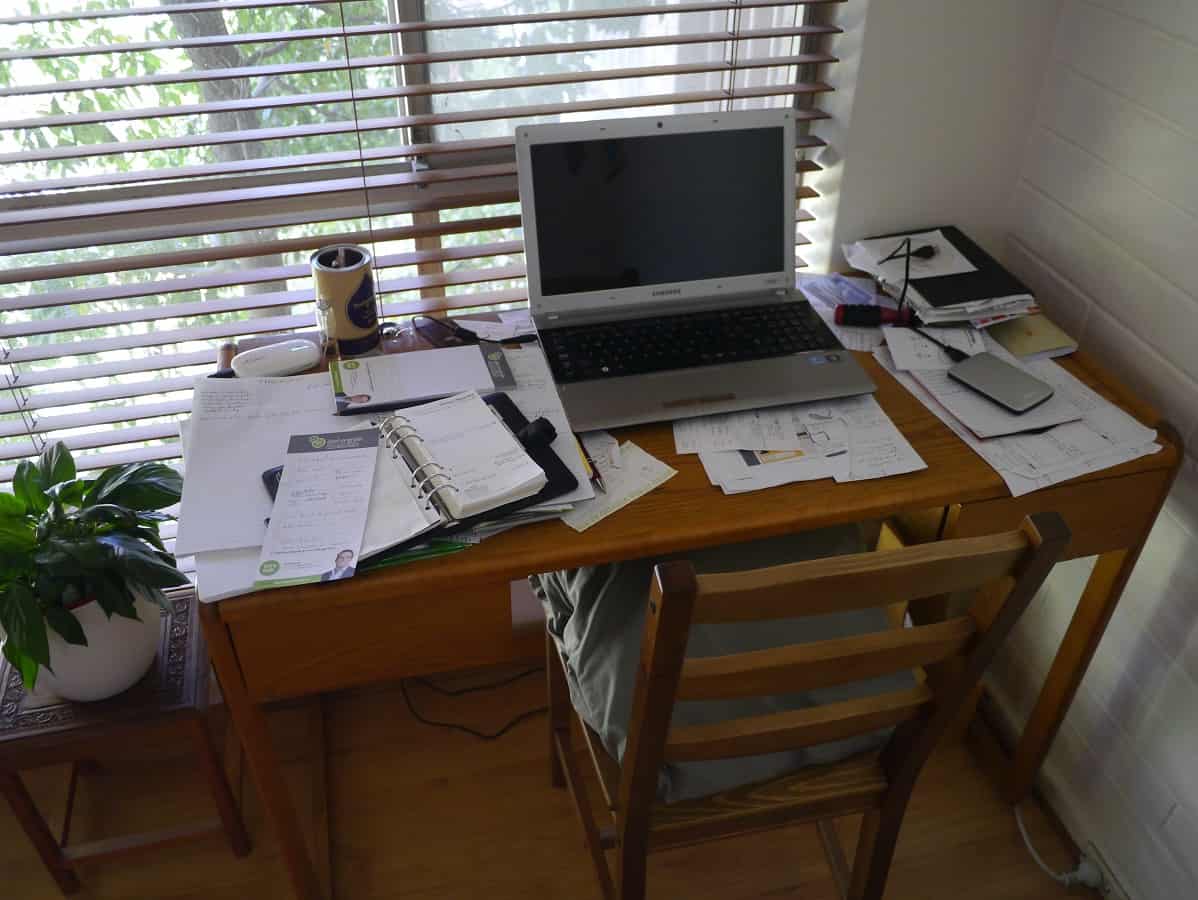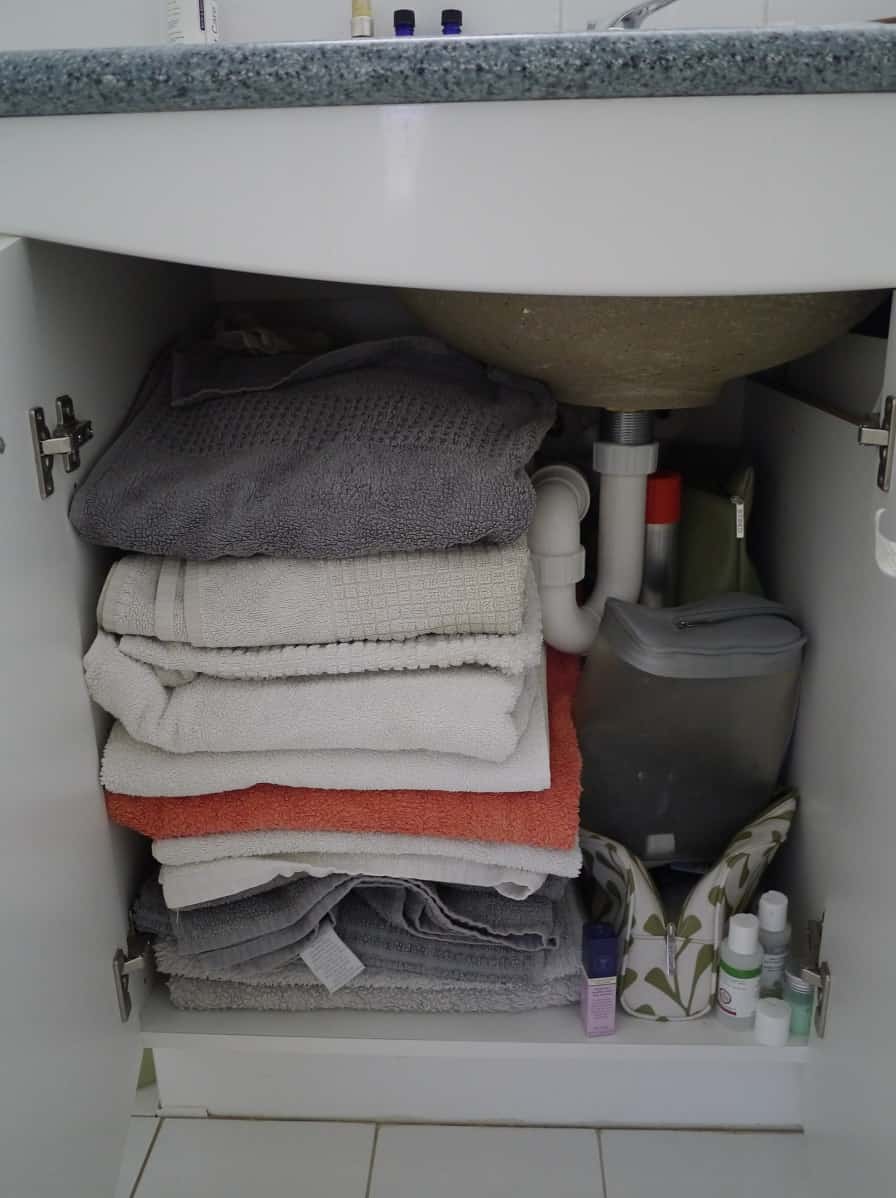My minimalist living space (I’d like to show you around…)
I often refer to the “tiny apartment” that I live in, and I’ve been thinking for a while that it would be nice to take some pictures and, well, invite you round for a (virtual) look.
But then I didn’t, because the flat was never quite tidy enough. Despite my constant quest to have less stuff, there always seems to be stuff cluttering up the place. It’s not that we have a great deal of stuff, but we also don’t have huge amounts of furniture or cupboard space to hide all our stuff like other people do. It’s a constant reminder to us that we have too much.
Another thing that put me off was that despite me calling our home the “tiny flat”, I realise that it is far bigger than many other “tiny” homes. In fact, there is a tiny house movement, and if you know anything about that you will realise that our flat in no way qualifies. Tiny homes are seriously tiny, and our apartment is palatial in comparison. I didn’t want to face the wrath of readers outraged that I have been making fraudulent claims all this time!
Lastly, I’m well aware that our flat is never going to be photographed for House Beautiful (or whatever those glossy home magazines are called). My eye for style goes as far as to recognise that some decor does indeed look pretty and stylish, and our flat has nothing like that in it.
We don’t have strategically placed cute retro teapots, or a surf board (why is it that every house I’ve seen photographed recently, no matter how far from the ocean, has a surf board?), or candles and flowers in all the corners. We don’t have quirky vintage antique stuff, we have old (and in some cases a bit tatty) stuff.
But then I got a grip on myself, and thought, so what? I like my house. Do I care that my house isn’t a interior designer’s dream? No. I like it. We like its simplicity. I like not having to dust all those quirky vintage nick-knacks.
Does it really matter that our flat isn’t the smallest house ever? Not at all. We are happy with the amount of space we have, so why would I compare it with other far smaller houses? They may be cleverly designed, inspiring and beautiful, but they would be too small for us at this stage in our lives. We need a space that we can live in, not one that impresses others with its tiny-ness.
Does it matter that it’s a bit messy and full of stuff? Well…I’d rather it wasn’t, or course… But we still invite our friends round, so why wouldn’t I take photos and invite my virtual friends round too? It’s just stuff, and it really shouldn’t have the power to influence my decisions!
So here’s the tour. It’s our attempt to live simply with less stuff; we have had some successes, but there are still plenty of areas we’d like to improve. It is a journey, and one that we’re always working on.
The Living Space
When you walk through the front door, you immediately step into the living space. There’s no porch or entrance hall. Our flat is pretty much a square, so from the front door you can see right the way through to the other side.


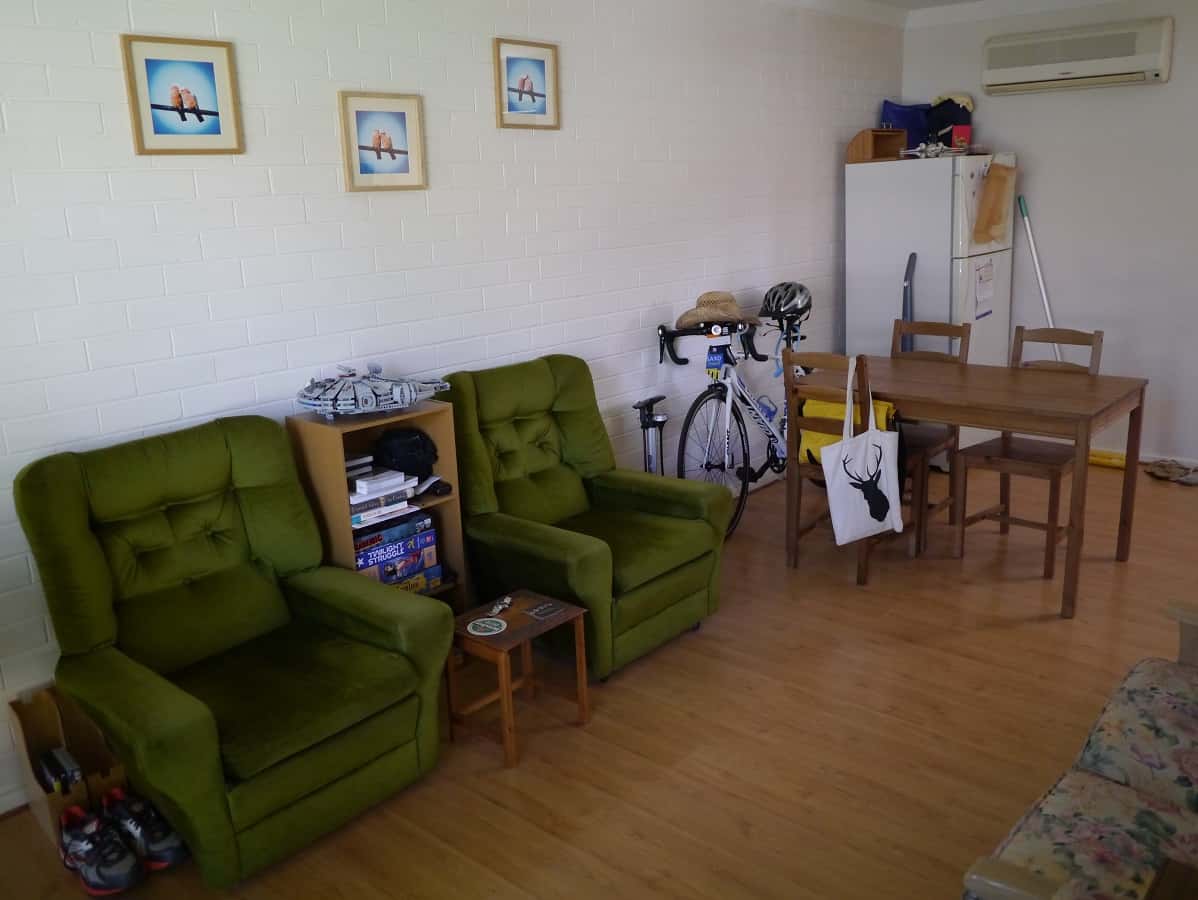 There’s no storage aside from what furniture we have, which means lots of things can’t be put “away”, as there is nowhere to put them. My bicycle lives next to the dining table, and our broom sits next to the fridge.
There’s no storage aside from what furniture we have, which means lots of things can’t be put “away”, as there is nowhere to put them. My bicycle lives next to the dining table, and our broom sits next to the fridge.
This is our entire book and DVD collection. We don’t own a single DVD, and of this little stack of books, three are actually loans from friends. Who needs books and DVDs when you can borrow what you want from the local library?
Books are a minimalism success; my desk, however, is not. On a typical day, it looks something like this. That’s not to say that I’m not organised, because I actually know what’s on all those little bits of paper and always notice when they get moved. I just have a terrible habit of writing on the back of old receipts and old envelopes, and they accumulate. Mess and clutter are not healthy though, and I need to go paperless to get things a bit more zen in my litter corner of the room.
The Bedroom
It’s a bit more zen in here. There’s no space for any furniture in the bedroom, although we’ve had to squeeze my boyfriend’s bike into the small amount of spare space that we do have.

 Fortunately we have an enormous built-in wardrobe…
Fortunately we have an enormous built-in wardrobe…
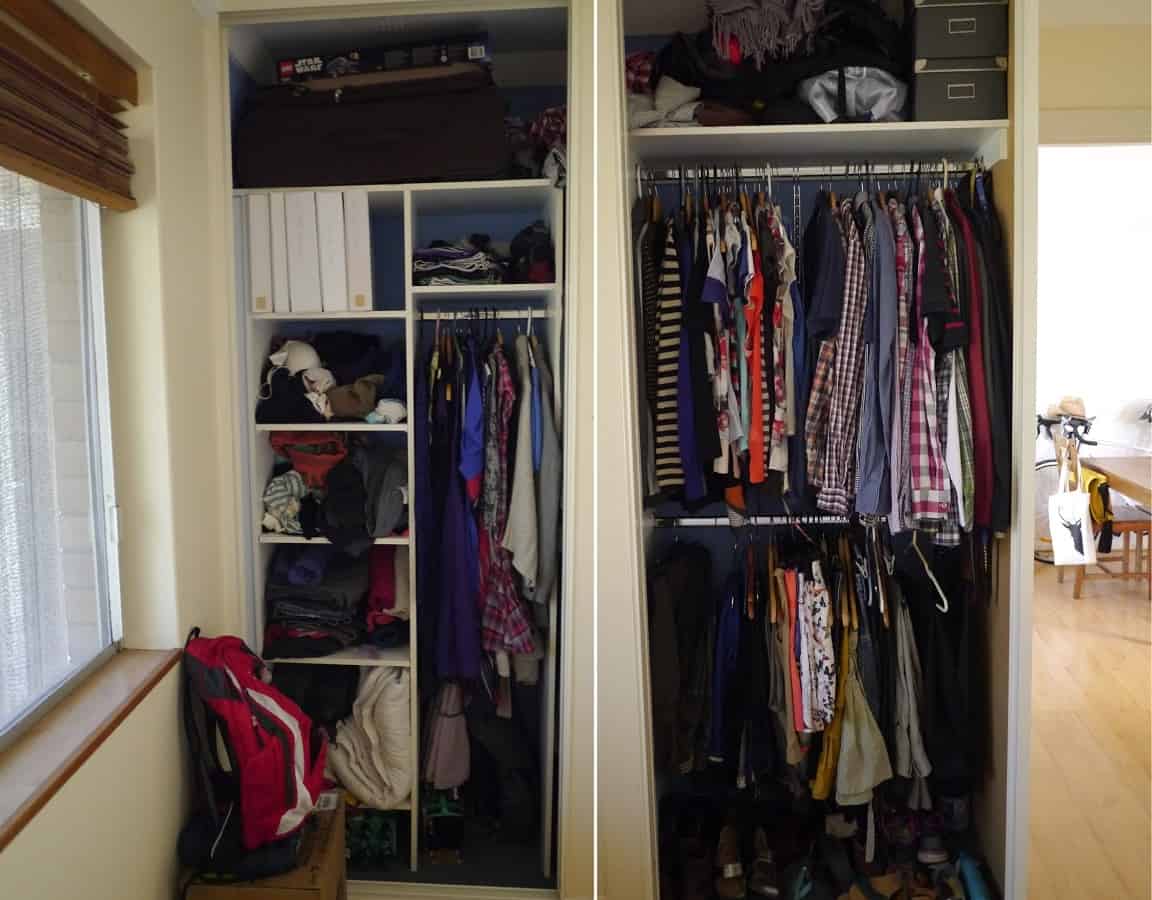 …and it is full to the point of almost overflowing! Yes, we have far too many clothes. No, they’re not all mine! Yes, I do have far too many pairs of shoes. Yes, they are all mine. Definitely an area I need to work on. But progress is being made. I’ve given clothes to the charity shop, and I’ve downgraded others to kitchen rag status. Last year I only bought a handful of items, and so far this year I’ve bought none. I don’t intend to buy anything else until my collection has at least halved. This is my compromise to myself, because I don’t want to send stuff to landfill, and there’s a lot in there that is too worn for the charity shop to take.
…and it is full to the point of almost overflowing! Yes, we have far too many clothes. No, they’re not all mine! Yes, I do have far too many pairs of shoes. Yes, they are all mine. Definitely an area I need to work on. But progress is being made. I’ve given clothes to the charity shop, and I’ve downgraded others to kitchen rag status. Last year I only bought a handful of items, and so far this year I’ve bought none. I don’t intend to buy anything else until my collection has at least halved. This is my compromise to myself, because I don’t want to send stuff to landfill, and there’s a lot in there that is too worn for the charity shop to take.
The Bathroom
Bathrooms in rented apartments are generally nothing to write home about, and ours is definitely no exception. There’s not too much clutter, but we do have a ridiculous amount of towels. (This isn’t even all of them – there were some hanging out on the line when I took the picture!) I’m reluctant to get rid of them; the charity shop won’t be able to sell them for much and I don’t want to send them to landfill. So another compromise – as they wear out they won’t be replaced. Right now, they (just about) fit into the space we have, and so they can stay.
There’s not too much clutter, but we do have a ridiculous amount of towels. (This isn’t even all of them – there were some hanging out on the line when I took the picture!) I’m reluctant to get rid of them; the charity shop won’t be able to sell them for much and I don’t want to send them to landfill. So another compromise – as they wear out they won’t be replaced. Right now, they (just about) fit into the space we have, and so they can stay.
The Kitchen
I would love a bigger kitchen as I spend a huge amount of time here (you may have noticed that I like to cook?!). Learning to manage with what space I have has been hard, but I think it’s been good for me. Oh, and don’t judge us – we rent this flat and did not choose the lime green/acid yellow tiles ourselves!

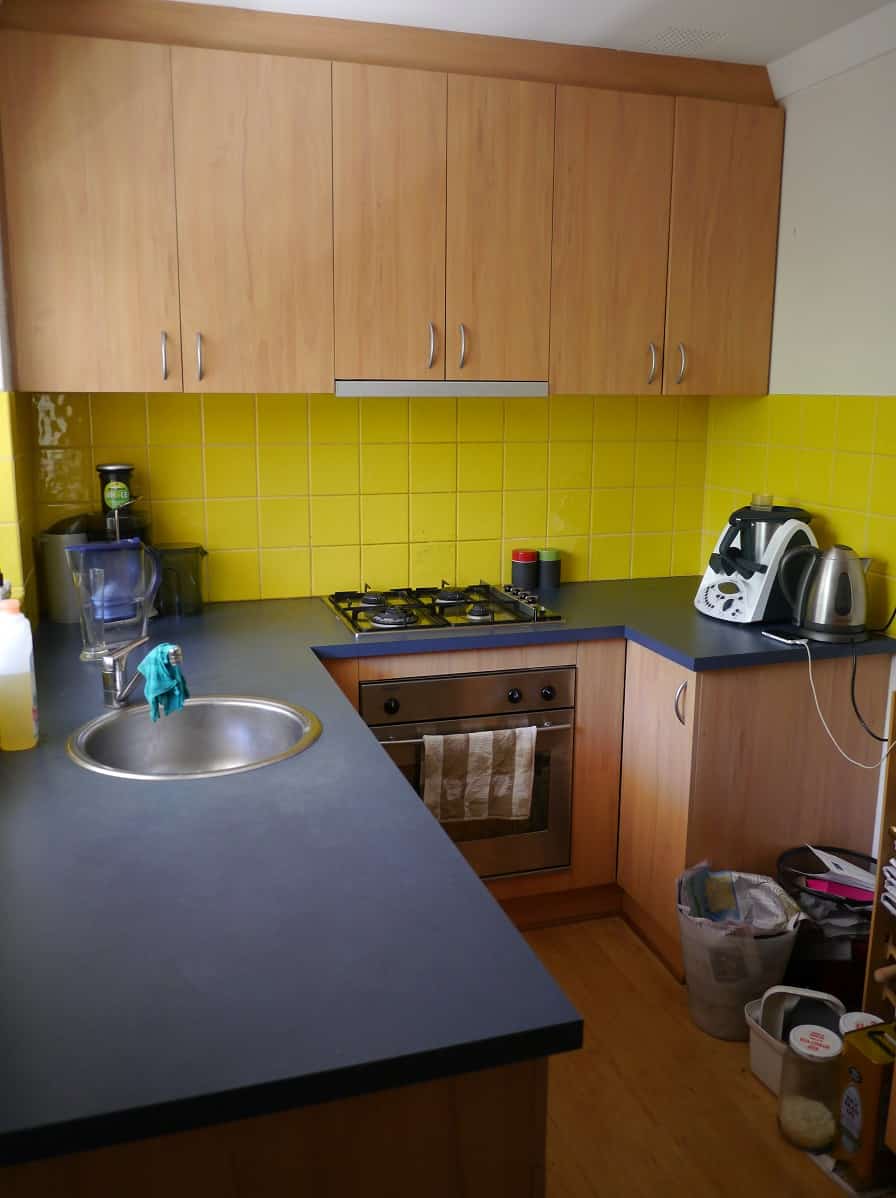 I’ve been able to keep the cupboards pretty orderly, and I only keep the things that we use regularly.
I’ve been able to keep the cupboards pretty orderly, and I only keep the things that we use regularly.
The pantry, however, is a different story! No matter what I do, I cannot seem to empty it out. I am pretty good at finding things in there, but my boyfriend does not fare so well, unless he knows there is a jar of chocolate spread… (I also don’t label the jars – surely everyone knows the difference between ground turmeric and ground cumin? Or rapadura sugar and soft brown sugar? They don’t? Oh. No wonder my boyfriend is reluctant to cook!) It’s cluttered, and awkward, and there’s been a few near-misses with almost smashing glass jars. But my love of food (and the bulk produce stores) means it never gets any less full. Any tips greatly appreciated!
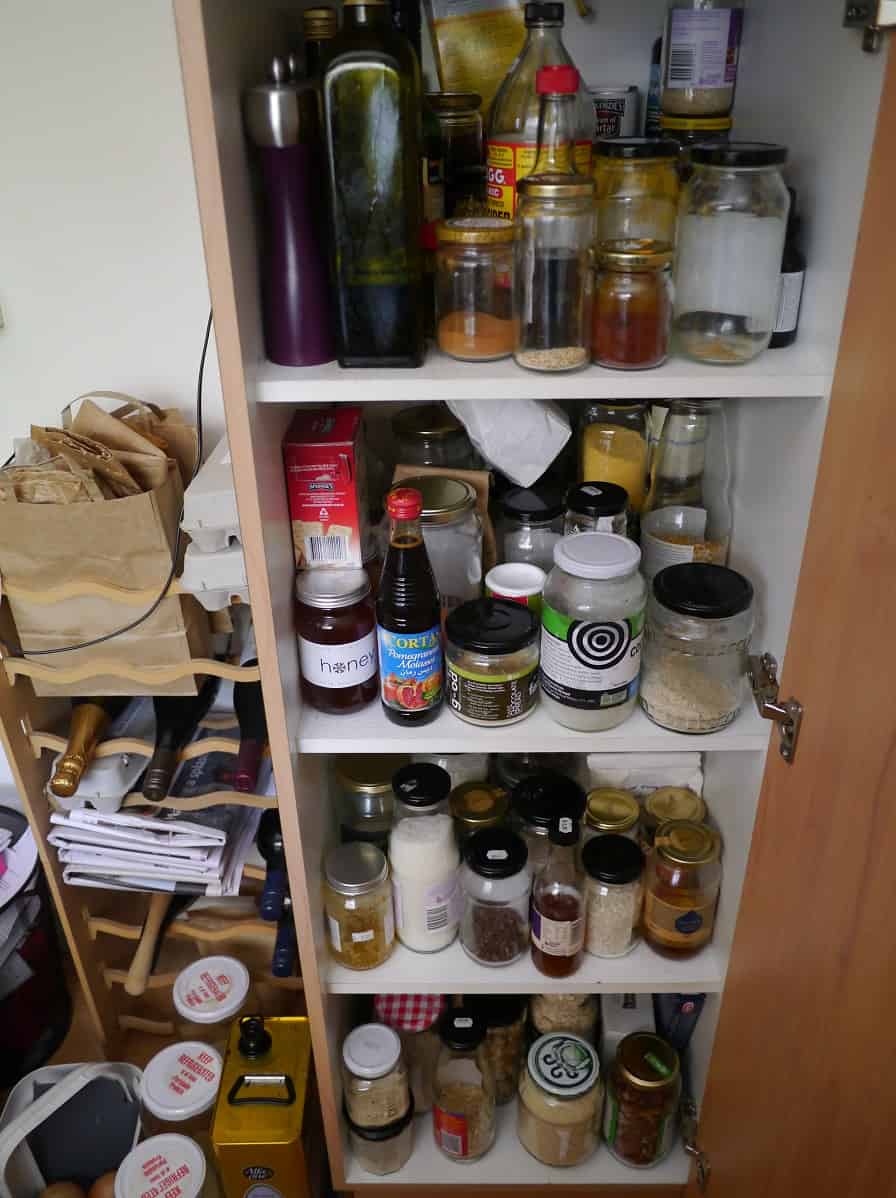 Those jars to the left of the pantry are there because they don’t fit in the pantry. Definitely a sign that I have too much in there!
Those jars to the left of the pantry are there because they don’t fit in the pantry. Definitely a sign that I have too much in there!
Outside
We have a small space outside, which houses our two worm farms and various gardening-related bits and pieces I collected from verge collections. I then discovered we don’t get any sunlight so we can’t grow anything much here, sadly.
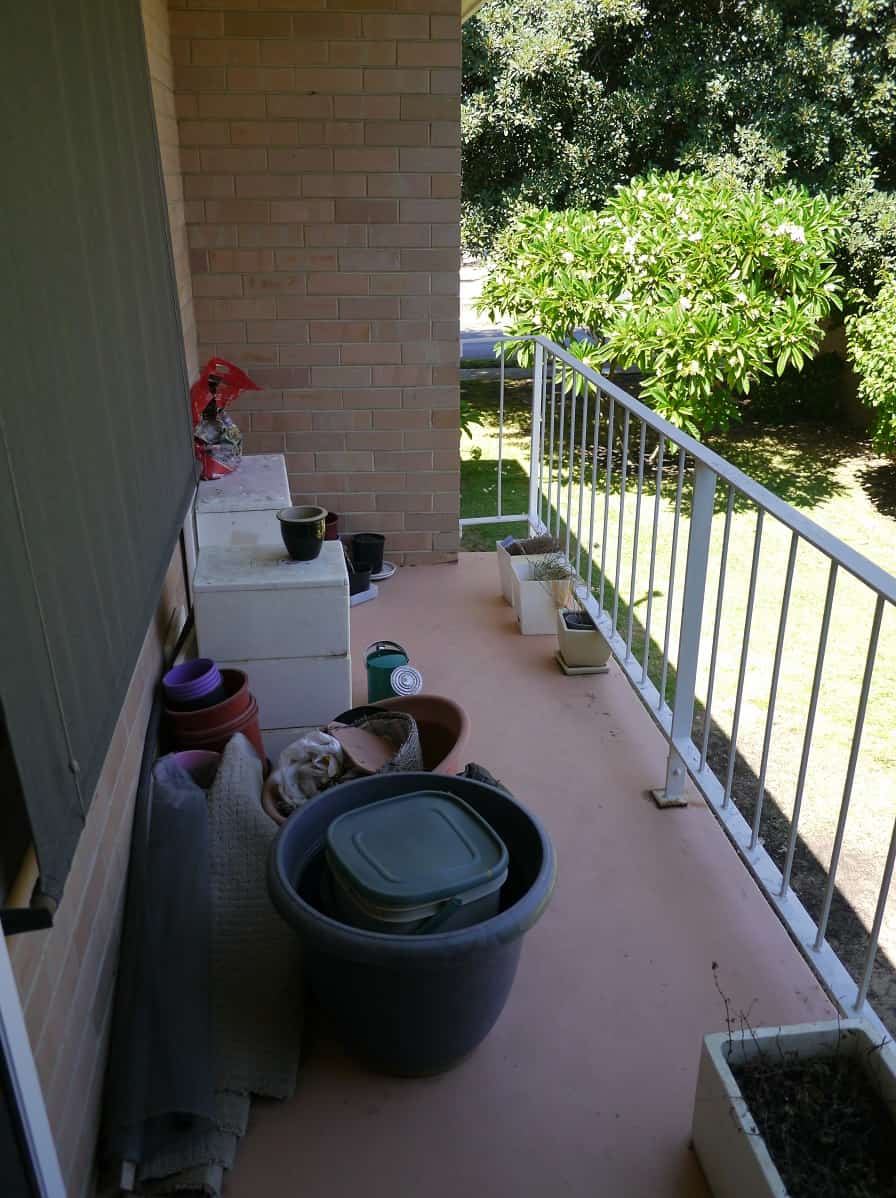 So that’s the tour. I hope you’ve enjoyed looking around. I’d love to hear what you think, and if you have any tips for those areas that I need a bit of help with, please share them below!
So that’s the tour. I hope you’ve enjoyed looking around. I’d love to hear what you think, and if you have any tips for those areas that I need a bit of help with, please share them below!
[leadpages_leadbox leadbox_id=1429a0746639c5] [/leadpages_leadbox]




